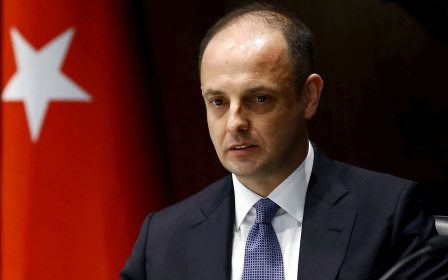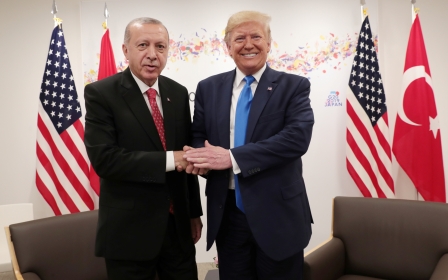Turkey’s new central bank governor under fire over plagiarism allegations

A group of Turkish academics on Monday accused new Turkish central bank governor Murat Uysal of plagiarism over a thesis he wrote for a masters degree, further inflaming his already controversial appointment.
Kemal Kizilca, an associate professor on economics at Ankara University who first raised the plagiarism suspicion on social media, told Middle East Eye that Uysal’s 2001 thesis on inflation targeting had parts very similar to a report published by a group of then-central bank experts.
“I found similarities and even sameness in Mr Uysal’s thesis and two other texts written earlier than the thesis,” he said. “For sure, there is an ethics problem. Further digging, another colleague of mine and an individual on Twitter found other similar parts.”
Uysal was already under fire due to the controversial sacking of his predecessor. Turkish President Recep Tayyip Erdogan fired former governor Murat Cetinkaya on Saturday before his term was up, due to his repeated insistence of maintaining a monetary policy depending on high interest rates to undercut soaring inflation, according to reports.
New MEE newsletter: Jerusalem Dispatch
Sign up to get the latest insights and analysis on Israel-Palestine, alongside Turkey Unpacked and other MEE newsletters
“Turkey sacked a governor for the first time in its history,” Ugur Gurses, a prominent economist, told MEE.
Erdogan has argued in the past that high interest rates were leading to high inflation and that therefore solid growth and lower inflation could only be achieved through cutting the rates. Cetinkaya, according to Turkish media reports, was resisting and citing the bank’s legal independence in the face of government pressure.
Uysal, who was Cetinkaya’s deputy, has a track record of serving in high-ranking positions in one of Turkey's leading state banks, Halkbank. Many raised suspicions that Erdogan chose Uysal because he could be expected to follow orders.
The thesis, written in Turkish and entitled “Inflation Targeting: World and Turkish Experiences”, was defended in 2001 by Uysal at Istanbul-based Marmara University. The thesis is in Turkish but it has an extended English summary, where the alleged plagiarism took place.
Associate professor Altug Yalcındag, whose speciality is also economics, tweeted: “Pages 130-131 of Murat Uysal's thesis has been largely copied and pasted from an NBER paper (@nberpubs) by Frederic S. Mishkin, "Inflation Targeting in Emerging Market Countries" (2000)”.
Can Okar, a Turkish commentator, revealed on social media that Uysal had in fact copied and pasted pages from three different articles: Frederic Mishkin (2000), “Inflation Targeting in Emerging Market Countries”, Ferya Kadioglu et al (2000), “Inflation Targeting in Developing Countries” and Melike Altinkemer (2001), “How Did They Manage the Floating Crisis?”
A Middle East Eye examination confirmed what the Turkish academics reported. Uysal’s thesis had pages of identical texts from other academics including central bank experts.
Although Uysal references Mishkin and Kadioglu in the bibliography, he does not reference Altinkemer, whose report appears to have been extensively used in the thesis.
The Turkish High Election Board (YOK) classifies plagiarism as an ethics violations that could result in the revocation of an academic title.
MEE reached out to the central bank for comment. At the time of publication, there was no response.
A well-known Turkish economist, who spoke of on condition of anonymity, told MEE that Uysal’s appointment and the revelations about his thesis would further solidify the view that institutions in Turkey no longer function.
“My God, we passed this point. Plagiarism or not. It isn’t important. People don’t trust the central bank anymore,” the economist said. “Do you understand how grave this is?”
Middle East Eye delivers independent and unrivalled coverage and analysis of the Middle East, North Africa and beyond. To learn more about republishing this content and the associated fees, please fill out this form. More about MEE can be found here.




